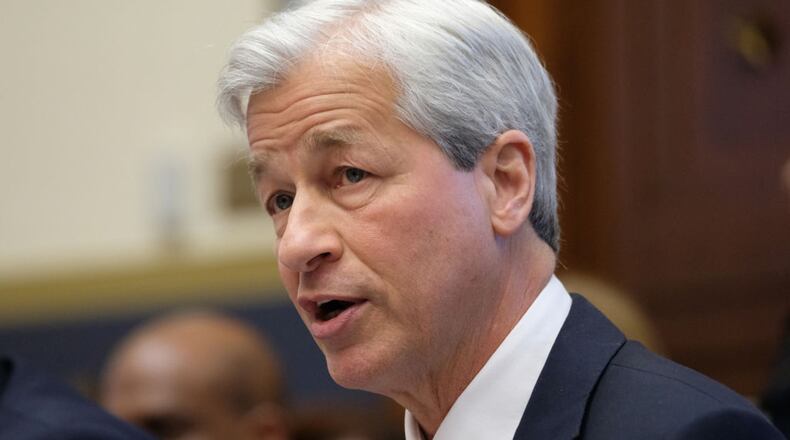Banking company JPMorgan Chase is investing $12 million into five organizations working to improve housing affordability in the Black, Hispanic and Latin communities. About $2.5 million of that money will be invested in Atlanta.
The investment announced Tuesday in Atlanta will come from a larger, five-year program that aims to spend $400 million toward homeownership stability for underserved households.
JPMorgan CEO Jamie Dimon made the announcement Tuesday from Herman J. Russell Center for Innovation and Entrepreneurship (RCIE). He discussed his commitment to closing the housing affordability gap through public/private partnerships during his chat with Atlanta Mayor Andre Dickens.
“You’re making a huge statement. This is not just charity,” Dickens said. “This is about making sure that you invest in the future of all Americans.”
The Atlanta portion of the JPMorgan investment will go through the Atlanta Neighborhood Development Partnership over the next three years. The nonprofit wants to prioritize risk-sharing business partnerships with smaller, local Black-owned real estate firms.
John O’Callaghan, Atlanta Neighborhood Development Partnership president and CEO, said the funds will also help them develop more affordable single-family homes, which will in turn create wealth in minority communities.
“Atlanta’s got an affordable housing problem,” O’Callaghan said. “So we’re working on this model to connect capital to small, often Black-owned, businesses whose product is a home that keeps people in their neighborhood.”
Credit: TNS
Credit: TNS
JPMorgan is also making a $2 million three-year commitment to the national, California-based Grounded Solutions Network nonprofit. The national nonprofit will use those funds to help distressed homeowners remain in their homes in Atlanta, Chicago, Houston and Minneapolis, according to JPMorgan officials. The nonprofit will also increase technical skills, production rates, and capacity of community land trusts and other nonprofit housing programs with the funds.
The Housing Partnership Network, Center for Community Self-Help, and Parity Homes will also receive millions of dollars from JPMorgan. The Urban Institute plans to work with the banking company to measure the impact of each organization’s work, according to the firm.
JPMorgan is the latest banking giant to invest into affordable housing efforts. Last week, Wells Fargo announced plans to put $1.3 million into an initiative to build 1,000 Atlanta homes on church-owned land.
Soaring housing costs have created affordability barriers for many citizens. Meanwhile, Black communities are still dealing with the negative impact of redlining, a discriminatory practice institutionalized by the federal government during the New Deal era and implemented then and now by private lenders, according to U.S. Department of Justice.
In October, the DOJ created an initiative to address redlining, which is prohibited by the Fair Housing Act and the Equal Credit Opportunity Act.
Dimon said the pandemic and the Minneapolis police murder of George Floyd showed that minority communities still “pay a much heavier price” across the board to live in America.
He said those events spurred JPMorgan to invest $30 billion into racial equity. But he said it’s going to take more than that to improve the inner-city schools, health care systems, and regulations negatively impacting budding small businesses. He urged more big companies to step up to help underserved communities.
Credit: Miguel Martinez for The Atlanta Journal-Constitution
Credit: Miguel Martinez for The Atlanta Journal-Constitution
“You need jobs, you need housing, and all these other things. It’s not just one thing,” Dimon said. “You’ve got to make progress in all these things at once.”
Dickens lauded JPMorgan’s efforts as the bedrock of support for addressing the wealth gap. The mayor said these initiatives help people who are working to become homeowners in the near future.
“We don’t want people living in subsidized housing forever,” Dickens said. “We want them to graduate out of the need to have supportive housing.”
About the Author
The Latest
Featured




